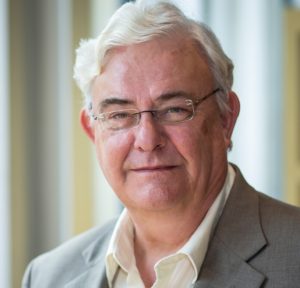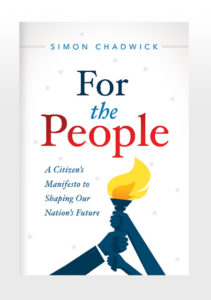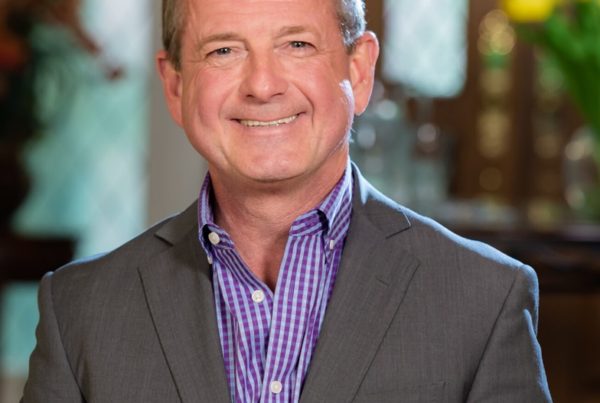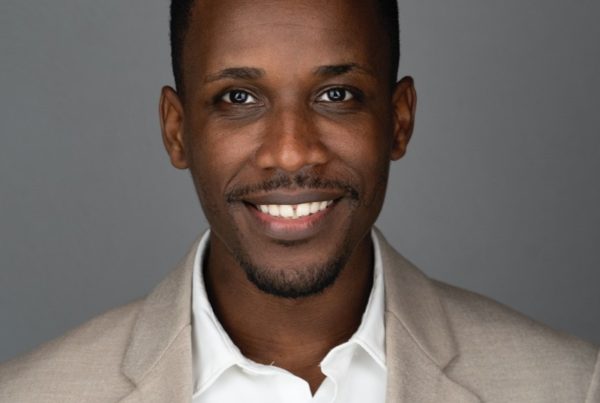Podcast: Play in new window | Download
Subscribe: RSS
How can we in the U.S. create a framework of security of all citizens?

Simon Chadwick
Growing up in South Africa as the son of a prominent anti-apartheid activist, Simon Chadwick has firsthand experience of living in a totalitarian society. Under these circumstances, Simon became very familiar with the tactics employed by politicians to suppress opposition, oppress large segments of the population, and engineer society to their own advantage.
After progressing through his career and moving to the United States over twenty-eight years ago, he increasingly noticed distinct and unnerving parallels to his early upbringing in the way U.S. politics were unfolding.
Simon’s academic background is rooted in politics—having earned a Master’s degree in Philosophy, Politics, and Economics from Oxford University—but his career has been in market and social research. For eighteen years, he was a corporate CEO and never earning more than six times the wage of his average staff member. Simon is an entrepreneur who has led two national trade associations and has been editor-in-chief of a global trade magazine for the last ten years.
Simon recently authored his book called For the People: A Citizen’s Manifesto to Shaping Our Nation’s Future that offers fascinating historical and cultural context, and clear, positive advice for how our country, culture, and government can move toward democratic libertarianism, self-actualization, and ultimate satisfaction.
What We Discuss With Simon Chadwick In This Episode
- What it was like to grow up as a white person in South Africa
- The differences and similarities among different societies
- Why he wrote the book/manifesto “For The People”
- The indecent role money plays in politics
- The government’s role in our society
- Defining self-interest
- Understanding the different narratives of people
Transcript Highlights
What Apartheid Is Like Through Simon’s Lens
If you’re in a society where the races are kept apart, blacks could not live in white areas and vice versa. Blacks needed passes to come into cities. You had to have a document that said you had a reason to be there. He recalls his dad being arrested by the secret police and interrogated. One of the priests died under interrogation by falling out of a seven-story window. People used to just disappear.
The Parallels and Differences in Societies
The U.S. is not really a melting pot, it’s more of a potpourri. People do tend to identify themselves by three different things – their hyphenated ethnicity (ex. Italian American, African-American, whatever), by the state that they come from, and by being American. If you come from Europe or any other similar country, there’s a very strong sense of homogenous identity.
But Simon remembers visiting Southern Arkansas and rural Mississippi for the first time and he found it similar to South Africa in the 1980s. There’s this distinct social stratum defined by skin color. He saw poverty in the rural areas which he had not seen since Africa.
We’ve got this history of slavery and genocide against the ethnic Americans, the original Americans. And until things like George Floyd happen, we tend to hide them all behind because we care about it, then we forget about it. The pandemic and George Floyd combined has ripped that curtain aside, revealing all the ugly truth, as well as some really beautiful truths like neighborliness, and people helping each other out and helping the elderly.
Now, they’re to be seen in full daylight. And it was those truths that somebody who was not natural American was able to see more easily because of his past.
The Impetus Behind the Book: For the People
Simon had seen the story swing towards authoritarians. We’re seeing politicians acting even more corruptly. Maybe there have been periods in American history where corruption and authoritarianism have become rampant. And if you talk to Holocaust survivors in this country, they will also tell you how incredibly uneasy they are because it’s resonant with what they saw in the 1930s.
The more Simon was researching for the book, the more he was able to distinguish what was so different about the U.S. in many ways. We have a tendency to believe that we’re really exceptional. But in many ways, we’re exceptional in the wrong way. If you look at health care, education, or social security, it’s always the minorities who are primarily disadvantaged. The net worth of an average white family is about $93,000, pre-pandemic. The net worth of the average African-American family was less than $4,000. And over half of African-American families are living with net negative worth.
It’s not just about race, but it’s also about a different construct of society. Much of it actually goes back to the Reagan era, if you think about mental health. In that era, the mental health system was effectively closed down and responsibility was transferred to the streets. “There is no such thing as society” has become a mantra on the right in many places. It’s the concept of what society should be or could be. And it’s now very divergent and dependent on your political points of view.
The Indecent Role Money Plays in Politics
Since Citizens United, huge amounts of what’s called “dark money” are playing in the system that’s rewarding the very wealthy as well as the politicians to preserve that.
A great book called The Dictator’s Handbook lays out the theory of how people become dictators. And essentially, what it says is that there’s a nominal electorate that everybody can vote but whether their vote counts or not, it doesn’t matter. Then there’s the winning coalition to put somebody in power. And usually, that coalition is relatively small. The smaller that coalition, the more likely you’re going to move towards dictatorship. All politicians have to pay off those who elected them. And in this country, it’s become smaller and smaller.
It’s going to take a movement to get money out of the equation. There are many other systems in the world where they’ve kept money out. In some countries, the state funds elections entirely and all candidates get equal amounts. In other countries, you can raise as much as you want, but you can’t spend it. You can only spend a certain amount on electioneering.
Whatever system we want to choose, we have to get the money out. Because only then will we be able to we’ll be able to return to the Constitution, where the legislature and the executive, and judiciary are indeed equal, and where all politicians actually are having to pay for their continued tenure in power in the public good.
The Government’s Role in Our Society
One of the things Simon did in the book was to look at society through the lens of Maslow’s hierarchy of needs. It starts off at the very basic needs, physical needs, moving up through belonging and self-actualization.
The role of our government is to create a framework of security in which people can obtain their needs and achieve the best they can be. People have all these fears (job loss, bills, etc.) that need to be eradicated for a society to grow and to flourish. Public servants have to understand that that job is to provide that framework. It is a social contract. You provide these things for us, and we’ll pay our taxes and obey reasonable laws.
In any of the Nordic countries, they define self-interest as the interests of everybody. Not only are those countries some of the richest countries in the world, but they’re also the happiest.
Understanding the Different Narratives of People and a Mindset Shift in Education
You can take two families in the same place who are demographically identical. And you would expect their views to be very similar but each of them has different narratives.
We need to teach people to think differently. The more we go into standardized testing and all that sort of stuff, the less we actually teach the child, particularly in empathetic thinking. It’s a mindset shift. You have to reevaluate what education is and we have to also be honest with ourselves about it.
Episode Resources 
Book: For the People: A Citizen’s Manifesto to Shaping Our Nation’s Future
Connect With Simon Chadwick
- Website: www.simonchadwick.us
- Twitter: https://twitter.com/simonchadwick
- LinkedIn: https://www.linkedin.com/in/simon-chadwick-613981/
- Facebook: https://www.facebook.com/DemocraticLibertarian/
Did You Enjoy The Podcast?
If you enjoyed this episode please let us know! 5-star reviews for the Leaders Of Transformation podcast on Apple Podcasts, Spotify, Pandora or Stitcher are greatly appreciated. This helps us reach more purpose-driven entrepreneurs seeking to make a positive impact in the world. Thank you. Together, we make a difference!
Additional Episodes You May Like
- 352: David Schwerin: How to Solve World Issues with Conscious Globalism
- 351: Smita Mishra: Making Businesses Planet-Positive
- 338: Jeremy Scrivens: Transforming the Future of Work Through Leadership and Convergence
- 326: Safwan Shah: Providing Faster Paycheck Access for American Workers
- 263: Vishen Lakhiani: Facilitating Global Transformation in One Generation










